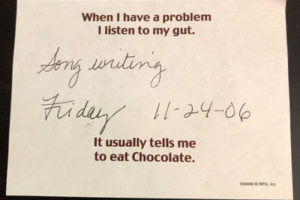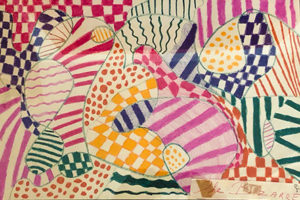Along with the song camps that I attended during 2007 and 2008, I took part in songwriting workshops sponsored by my local and other NSAI chapters. Our Birmingham chapter held monthly meetings with opportunities to play our songs and have song critiques. They sponsored several concerts at local music venues where we could showcase our songs as singer-songwriters. Sometimes there were special events where professional songwriters from Nashville presented workshops. I attended sessions with Steve Seskin, Tom Hambridge, Carrie Tillis, Nancy Moran, Georgia Middleman and Gary Burr, and Pat and Pete Luboff.
A creative life is risky business. To follow your own course, not patterned on parents, peers, or institutions, involves a delicate balance of tradition and personal freedom, a delicate balance of sticking to your guns and remaining open to change. While on some dimensions living a normal life, you are nevertheless a pioneer, venturing into new territory, breaking away from the molds and models that inhibit the heart’s desire, creating life as it goes. Being, acting, creating in the moment without props and supports, without security, can be supreme play, and it can also be frightening, the very opposite of play. Stepping into the unknown can lead to delight, poetry, invention, humor, lifetime friendships, self-realization, and occasionally a great creative breakthrough. Stepping into the unknown can also lead to failure, disappointment, rejection, sickness, or death.
— Stephen Nachmanovitch, Free Play: Improvisation in Life and Art
Advice from Songwriting Workshops
Tom Hambridge, August 22, 2009 in Birmingham, Alabama
You can’t have any weak links in a song.
Write pictures, not words. (e.g., “Coffee colored Cadillac” from Chuck Berry’s song “Nadine”)
The song is in the room, you just have to find it. Be open to it.
You must be driven to push your career.
Carrie Tillis, May 15, 2010 in Birmingham, Alabama
A good way to check your songs is to speak your songs. See what speaks and sings easily. Is the phrasing natural?
If you get stuck, look back through your notebooks to see if you have an idea somewhere else to piece with it.
Everybody has a different path and their own voice.
Georgia Middleman and Gary Burr, August 22, 2010 in Montgomery, Alabama
I was very excited to attend this workshop. Keith Urban had just come out with his big hit “I’m In” which was co-written by Georgia Middleman and Radney Foster. I knew I needed to meet someone who could write a song like that!
Georgia’s Advice:
Writing is a muscle. You have to keep using it.
Songs come from an honest place. It’s how you feel.
Gary’s Advice:
In the country format, you have to write how people talk.
Always have a pencil handy! Listen to people talk. Listen for inspiration.
You will hear story ideas all day long. Even at 3 a.m. Get up and write them down. Honor the creativity! If something resonates with you, honor it and write it down.
Say something new. Or, say something old in a new way.
Paul Simon asks after every song, “All these adjectives and adverbs, are they the best I can do?”
You really need to bring discipline to songwriting.
Chip away until you find the “David” in the song.
The North Star:
Reduce every song to a sentence. Then go through line by line to see if they line up with the North Star idea. Every line must clarify or lead to the North Star.
I really liked Gary’s no-nonsense approach and sense of humor. In 2017 I took an online series of songwriting classes with him. I took it as a refresher and to get excited again. I wanted to remember why I decided to write songs.
Pat and Pete Luboff, [2008] in Birmingham, Alabama
Each genre has its own set of parameters. Each has its own language and musical qualities. Find the one you love and steep yourself in it. Create songs that fit that culture.
Steve Seskin, March 8-9, 2008 in Columbus, Georgia
I heard great things about Steve Seskin. He had seven number one hits. He also had written children’s books with stories that help teach ideas of acceptance and diversity. I found an interview with him. He says exactly how I feel. Here’s what he says:
Every writer should have some sort of vision of who you are, and what you’re trying to say, and what kind of writer you are. As you develop as writers, I think it’s really important to figure out what your niche is. What is your thing that you need to be true to? . . . but I think you owe it to yourselves to keep trying to figure out who you are—what your voice is, as a writer, and to keep nurturing that. You’re going to have to nurture that in the face of a whole lot of people saying, “You can’t do it. This isn’t good enough.”
— Steve Seskin, from a seminar at the TAXI convention Road Rally 2002
(transcribed at the website Addicted to Songwriting)
From Steve’s classes:
Be observant. There are song ideas everywhere. Write them all down. Especially notice and chronicle emotional moments—notice the words that were used.
Find out what makes you—you. Be honest.
Songs should not feel “written.” They are organic.
Songs must have heart and be well crafted.
Don’t waste any words in a song. It’s a small package, don’t waste time with details the listener already knows or doesn’t move the story forward.
Steve quoting other songwriters:
Randy Newman: “that we have a responsibility to our times.” (The music that we write should reflect the era that we live in.)
Alan Shamblin: “Never let the facts get in the way of the truth.” (An emotional truth, that is.)
Bob DiPiero: “Music is for people to forget about their troubles. It’s to roll down the top, drive down to the beach, and forget about their life and all of its problems.” Steve says, “No. Music is to move people, to make them feel, to make them think, to make them cry, to make them laugh, to move them. You know what . . . we are both right. It’s for all of that.”
My Thoughts after the Songwriting Workshops
Steve Seskin was everything I had heard. He is a wonderful teacher. I learned a great deal. Maybe not new things but his classes were very detailed and well organized.
He used examples of his songs and walked us through how he got from the idea to the song and how he wrote and rewrote to make “good” lines “great” lines. I learn better that way—from real examples rather than broad strokes of general principles. I am really glad I went.
He critiqued one of my songs. He drew names from a box. (There were about thirty people there.) I NEVER get my name drawn for anything so I was astounded. I had chosen a song that I would like to rewrite—not my best song—but one I think has some good things. It was “Gotta Have Faith.”
He was very helpful by giving me many ways to rework the song. I should examine it from different perspectives and not just keep with my original vision. In fact, that is his strength—telling us ways of thinking about all the possibilities of a song.
Thoughts on Songwriting
After several years I reached a point where I wanted to be able to judge my own songs. I had learned a great deal—but I was not writing for country radio and I am not a typical singer-songwriter.
I was still unsure what my songs were. What genre? Where would they fit? My only idea so far was that I probably needed to perform them myself. I needed to work on my own to see if I could craft my songs into what I wanted them to be. Honestly, it was still more like Gary Burr’s quote: “Chip away until you find the ‘David’ in the song.” As hard as I tried to follow Steve Seskin’s advice, it felt like my process was more write and find it as I go.
I tend to be more intuitive in my songwriting. I find it difficult to write from a logical point of view. However, I don’t think one way is better. In fact, I would prefer to be more analytical and calculating. I was hoping these songwriting workshops could teach me that. They did give me the knowledge about all that, but in the end, I have to work my process the best I can—while following all the basics I learned.
§
From the vantage point of 2021, I find I am still developing my vision as a songwriter. Perhaps that is what is normal for me—always searching and trying to be open to all possibilities.










Leave a Reply
Your email is safe with us.